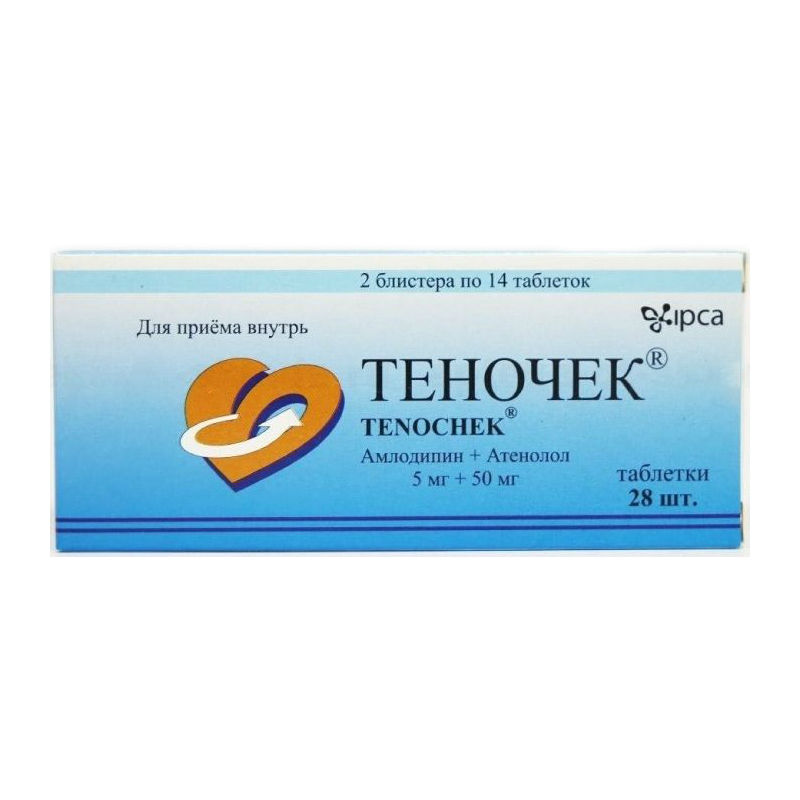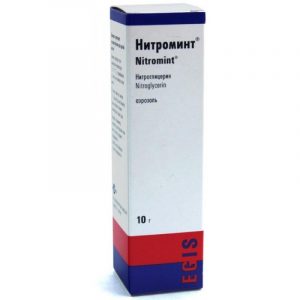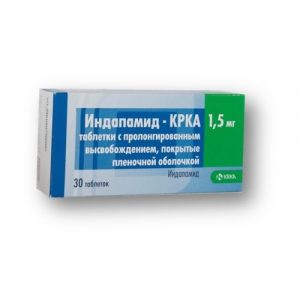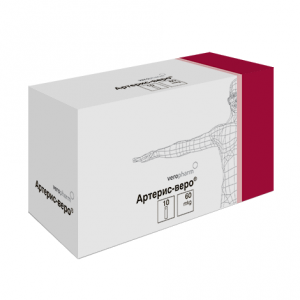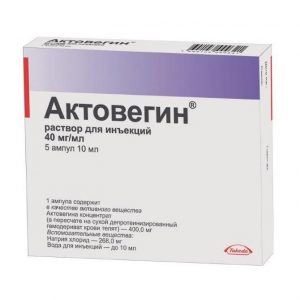Description
Release form
Coated tablets.
Packing
28 pcs.
Pharmacological action
Tenochok has an antihypertensive effect.
Contraindications
Hypersensitivity, AV block II-III Art. CHF (resistant to treatment with cardiac glycosides) bradycardia cardiogenic shock hepatic and / or renal failure bronchial asthma pregnancy, lactation, childhood.
Caution. AV block I st., Chronic bronchitis, emphysema, gout, obliterating diseases of the arteries, disturbances of the water-electrolyte balance.
Special instructions
With thyrotoxicosis, the drug may mask certain clinical signs of hyperthyroidism (eg, tachycardia). Abrupt abolition of Tenocek in patients with thyrotoxicosis is contraindicated, since it can enhance symptoms.
The drug slightly enhances insulin-induced hypoglycemia and does not delay the restoration of blood glucose concentrations to normal levels.
Dose selection in patients with chronic heart failure (compensated) should be carried out with caution.
If surgery is necessary under general anesthesia, the drug should be discontinued 48 hours before surgery. As an anesthetic, you should choose a drug with a possible minimal negative inotropic effect.
When used concurrently with clonidine, tenochek is stopped a few days earlier than clonidine in order to avoid the withdrawal syndrome of the latter.
It is possible to increase the severity of allergic reactions and the lack of effect of the usual doses of epinephrine in patients with a burdened allergic history.
Catecholamine-lowering drugs (such as reserpine) may increase the effects of beta-blockers, so patients receiving this combination of drugs should be constantly monitored to detect a pronounced decrease in blood pressure or bradycardia.
In the case of elderly patients with severe bradycardia (heart rate less than 50 / min), a significant decrease in blood pressure (systolic blood pressure below 100 mm Hg), AV block, bronchospasm, ventricular arrhythmias, severe liver and kidney dysfunctions dose or cancel Tenochok.
With the development of depression while taking the drug, it is recommended to stop therapy.
If intravenous administration of verapamil is necessary, this administration should be done at least 48 hours after the last administration of Tenocek.
When using atenolol, a decrease in the production of tear fluid is possible, which is important for patients using contact lenses.
The drug should be discontinued before examining the concentration in blood and urine of catecholamines, vanillyl mandelic acid, and antinuclear antibody titers.
In smokers, the effectiveness of beta-blockers is lower.
Monitoring laboratory parameters
It is necessary to control heart rate and blood pressure (at the beginning of treatment – daily, then 1 time in 3-4 months), the concentration of glucose in the blood in patients with diabetes mellitus (1 time in 4-5 months). In the elderly, it is recommended to evaluate renal function (1 time in 4-5 months).
The patient should be trained in the method of calculating heart rate and instructed on the need for medical advice for heart rate less than 50 beats. / min
Influence on the ability to drive vehicles and control mechanisms
Tenochka should be prescribed with caution to patients involved in potentially hazardous activities, due to a possible decrease in concentration.
Composition of
1 tablet contains active substances:
Active substances: atenolol 50 mg, amlodipine 5 mg.
Excipients: corn starch, calcium phosphate dibasic, microcrystalline cellulose, povidone-30, sodium starch glycolate, purified talc, magnesium stearate, colloidal silicon dioxide, isopropyl alcohol, purified water.
Dosage and administration of
Tenochok is taken orally with a necessary amount of liquid. With arterial hypertension and angina pectoris, the dose is 1 tablet per day. If necessary, the daily dose can be increased to 2 tablets per day. The maximum daily dose is 2 tablets.
Side effects
Hyperuricemia, hypokalemia, impaired glucose tolerance, bradycardia, heart block, orthostatic hypotension, heart failure, cold limbs, intermittent claudication, Raynaud’s syndrome, confusion, mood swings, hallucinations, sleeplessness, nightmares, dry eyes, dyspeptic disorders and visual disturbances, leukopenia, thrombocytopenia, purpura, alopecia, psoriasis, paresthesia, bronchospasm
Drug interaction
When used simultaneously with insulin (or oral hypoglycemic agents), the symptoms of hypoglycemia are masked (due to the action of atenolol).
With the combined use of Tenocek with antihypertensive drugs of other groups, a mutual intensification of the hypotensive effect occurs.
The hypotensive effect of the drug is weakened by estrogens, corticosteroids, mineralocorticoids, NSAIDs (due to sodium retention).
With the simultaneous use of atenolol and cardiac glycosides, the risk of developing bradycardia and impaired AV conduction increases.
With the simultaneous administration of atenolol with reserpine, methyldopa, clonidine, verapamil, severe bradycardia may occur.
When taken with ergotamine and xanthine derivatives, the effectiveness of atenolol is reduced.
Concomitant use with lidocaine may slow the elimination of atenolol and amlodipine from the body and increase the risk of toxic effects of the drug.
Use in conjunction with phenothiazine derivatives helps to increase the concentration of active substances in blood serum.
Phenytoin (with iv) and agents for iv anesthesia increase the severity of the cardio-depressant action of atenolol.
allergens, used for immunotherapy, or allergen extracts for skin tests and iodine-containing radiopaque substances for iv administration increase the risk of severe systemic allergic reactions or anaphylaxis.
Means for inhalation general anesthesia (hydrocarbon derivatives) increase the risk of inhibition of myocardial function and a marked decrease in blood pressure.
When used together, amiodarone increases the risk of developing bradycardia and slowing AV conduction.
Cimetidine increases the concentration of atenolol in blood plasma (by inhibiting its metabolism).
When used together, Tenochok prolongs the action of non-depolarizing muscle relaxants and the anticoagulant effect of coumarins.
Overdose
Symptoms: severe bradycardia, AV block II and III degree, an increase in symptoms of heart failure, a marked decrease in blood pressure, bronchospasm, hypoglycemia.
Treatment: symptomatic. Hemodialysis is not effective.
Storage conditions
In a dark place at a temperature not exceeding 25 ° C.
Deystvuyuschee substances
amlodipine, atenolol
PMA
tablets
